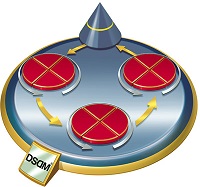
Dynamic Systems Development Method for Oracle Policy Automation
The DSDM is a proven agile framework for project management and delivery, which concentrates on strategic goals and incremental delivery of real business benefits while keeping control of time, cost, risk and quality.
It acknowledges that change is often inevitable, as the understanding of the solution deepens to address underlying points of ambiguity in the original requirements. This is all the more relevant in the context of an Oracle Policy Automation project, whose main challenge is the removal of ambiguity in the source material.
To cope with change, if the DSDM framework does stipulate the need for a high-level version of the source material in the early phase of the project (to lay the foundation for development and delivery), it will nonetheless treat that original source material as work in progress, with different versions allowed or, better, expected to be released at different points in time.
Here, the DSDM aims at removing the illusion of security and the instability inherent to document-driven processes (specification of every detail of requirements, solution design, plans, etc, in the original document that gets 'signed off' by stakeholders before work is allowed to progress is idealistic and ineffective).
Instead, it shifts the articulation of the project to incorporate change requests, which will be implemented either on the fly (=> immediate development during a Joint Application Development session for example) or iteratively, following each impacted release of new or updated source material.
To allow this, an active collaboration is promoted especially between developers (in the case of OPA, rule developers) and the requirements team - possibly with the help of business analysts - to ensure a constant ideal match between expectations and results.
➠ Responding to change over following a plan
It is important not to shun processes, tools, documentation (all the more important, to track changes) and plans but instead to ensure that they are only created where they add value, and only to the level of detail that adds value.
There are 7 DSDM principles characterising the mindset that enables to deliver consistently whilst still remaining flexible:
- Focus on the business needs
- Collaborate & communicate continuously
- Develop iteratively
- Ensure high quality
- Deliver on time
- Demonstrate control
- Expect change and manage it